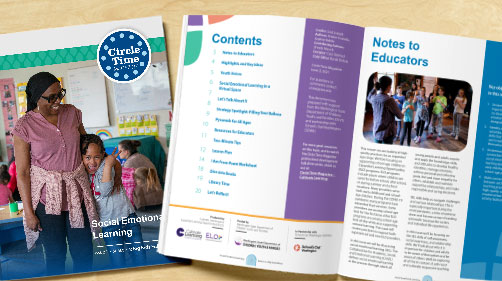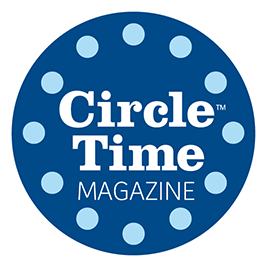Big Kids, Episode 2: Social Emotional Learning
Esta página también está disponible en español
In this episode we’ll be focusing on the social emotional learning (SEL) skills of self-awareness, social awareness, and relationship skills. We’ll talk about why it is important for children and adults to be aware of themselves and be aware of others. We’ll be exploring all of this in context of anti-racist and culturally responsive teaching.
Watch now: Episode 2, Social Emotional Learning!
Download your copy of Social Emotional Learning now!

Each Circle Time Magazine episode includes an educational video delivered in talk show format. Join us for Episode 2 to learn more about social emotional learning.
For 1-page activity plans and more information on growing social emotional learning skills download the print version or view the magazine online.
Dive into Books
Books for kids:
Read aloud:
- I am Peace by Susan Verde (Spanish Edition: Yo soy Paz por Susan Verde)
- When Sophie Gets Really, Really Angry by Molly Bang (Spanish Edition: Cuando Sofía se enoja, se enoja de veras por Molly Bang)
- Charlotte and the Quiet Place by Deborah Sosin
- Pensamientos by Alexis Ruginis
Chapter books for readers 8 years and older:
- El Deafo by Cece Bell (Spanish Edition: Supersorda por Cece Bell)
- Healer of the Water Monster By Brian Young
- Jo Jo Makoons: The Used-to-Be Best Friend by Dawn Quigley
- Rules by Cynthia Lord
Books for grown-ups:
- The Whole-Brain Child by Daniel J. Siegel, M.D. and Tina Payne Bryson, Ph.D. (Spanish Edition: El cerebro del niño pro Daniel J. Siegel, M.D. and Tina Payne Bryson, Ph.D.)
- Educación emocional y apego: Pautas prácticas para gestionar las emociones en casa y en el aula by Rafael Guerrero (Available only in Spanish)
- Trauma Stewardship: An Everyday Guide to Caring for Self While Caring for Others by Connie Burk and Laura van Dernoot Lipsky
- Raising An Emotionally Intelligent Child by John M. Gottman
Two-Minute Tips
Two-Minute Tips are quick, simple professional development resources. Here are some Tips related to this episode.
Helpful Resources—Episode 2: Social Emotional Learning
School’s Out Washington (SOWA) is dedicated to building community systems that support quality afterschool, youth development, and summer programs for Washington’s children and youth ages five through young adulthood. SOWA provides training for youth development professionals and it advocates for the Expanded Learning Opportunities field statewide.
Designed for kindergartners through fifth graders, Go Noodle is a tool that gives teachers and parents short interactive activities to get kids moving. Desk-side movement helps kids achieve more by keeping them energized, engaged, and motivated throughout the day.
Learning for Justice provides free resources to educators—teachers, administrators, counselors and other practitioners—who work with children from kindergarten through high school. This website includes free lesson plans, printable classroom posters, and film kits.
Support social and emotional learning with this collection of diverse books that build a positive sense of self and help children effectively apply the knowledge, skills, and attitudes necessary to manage emotions, set and achieve positive goals, and establish and maintain respectful relationships.
Communities for Just Schools writes about the need to re-examine the way that social emotional skills are talked about and taught in schools. This article explores some programs in which social emotional learning skills are being taught in a way that tells children they must conform to certain ideals and not be their most authentic selves.
This toolkit developed by the University of Minnesota Extension Center for Youth Development includes activities, templates, and tools organized around four ways to help support staff and children in SEL development. It’s designed primarily for those working with youth in middle school but, with small changes, the activities can be used for other age groups, too.
TRANSLATION NOTE: Please be aware that there might be slight discrepancies and minor differences between the posted, printed, or electronic text in English and the corresponding Spanish translation, due to the editing and updating of the different versions.
Contact Us
Please contact us at cultiv8@uw.edu if you have questions about Circle Time Magazine. Like Cultivate Learning on Facebook and Instagram to stay connected to our latest work.
Want more of Circle Time Magazine?
We've got whole collection of episodes for you to dive into. Check out more of Season 4.







